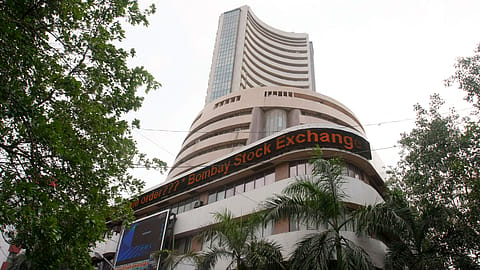Markets close another week in red
The slide continued through the week, though at a slower pace and also with some recovery. The Sensex ended Friday’s trade 2.39% lower from the previous day’s close. The Nifty 50 closed 2.06% lower.

The markets ended another week in red on Friday with the steady rise of Covid-19 cases across the world.
The Sensex and the Nifty 50 closed the day lower by 2.39% and 2.06% at 27,590.95 points and 8,083.8 points respectively, compared to Wednesday’s close. Trading began weak. The indices gained 1.32% and 1.24% to touch their day’s high of 28,639.12 points and 8,356.55 points respectively. At the day’s low of 27,500.79 points and 8,055.8 points, Sensex and Nifty 50 lost 2.7% and 2.4%.
The S&P BSE MidCap and SmallCap indices closed the day 1.17% and 1.03% lower. While the respective indices gained 0.72% and 0.63% at their day’s high, they lost 1.45% and 1.34% each their day’s low.
According to Vinod Nair, head of research at Geojit Financial Services, the markets opened and stayed negative, but with reduced volatility. “A ratings downgrade for the banking sector, due to the impact of Covid-19 and ensuing stressed asset concerns, impacted the financial stocks,” says Nair.
He further highlights that foreign portfolio investors (FPIs) were net sellers to the tune of ₹1,100 crore, on April 1, and show no signs of reversal. “Markets are trading uncertainty, regarding the spread of the virus in India, as hope emerged of infections peaking in some of the worst affected global markets," Nair opines.
Frantic investor action in the sugar sector has been eye-catching lately. S. Ranganathan, head of research at LKP Securities, highlights smart buying continued in the sugar sector as many of the well run integrated factories were trading at market capitalisation equal to the cost of putting up boilers leave alone the sugar factory, distillery and power plant. “This speaks about the destruction witnessed in the broader market,” says Ranganathan.
On the weekly basis, Sanjeev Zarbade, vice president, private client group at Kotak Securities, points out that the Sensex declined 7% in the current week as the number of Covid-19 cases saw a steady increase in India over the week. And, FPIs sold equities worth $1.1 billion over the past five trading sessions while domestic institutional investors (DIIs) bought $0.89 billion worth of equities in the same period.
Recommended Stories
“Investors remain concerned on the accelerated rise in infections across the world and potential economic fallout of the same,” says Zarbade. “While the timing of the control of the Covid-19 pandemic is uncertain, we find that valuations are now entering the value zone,” he adds. “Our advice to investors is that, buy companies with strong balance sheet that are able to ride through these difficult times.”
The saving grace for the market lately is the reduction in level of volatility. Joseph Thomas, head of research at Emkay Wealth Management rightly points out that the slide in the markets, after a brief interlude of short recovery, continued during the course of this week, but it is comforting to see that the pace of the fall is relatively feeble now. “The negative news flow has subsided substantially and since the fall was to the tune of 30% to 40 % across the board, it is likely that investors may start seeing value in purchases from now on,” Thomas opines.
Going forward, Thomas is of the view that businesses which have good cash flow, along with good cash levels and cash equivalents with them, and also enjoy leadership positions especially in the market share may see good interest from investors. “Higher intrinsic value compared to the prices at which assets are available may act as a spur for discerning investors,” says Thomas. “The developments in the US, the events around crude oil prices and gold, and also the additional domestic fiscal measures would be the key factors which the markets would be watching as we move on to the next week.”
Read our full coverage of the coronavirus outbreak and its impact here.
(INR CR)